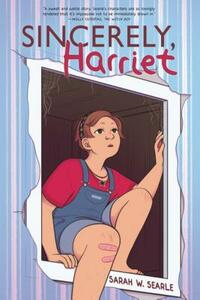Take a photo of a barcode or cover
A quick read about a teen with MS. Her family has just moved to Chicago to be near medical specialists, and Harriet is friendless and lonely. Her illness prevented her from maintaining friendships in her old town, and she hasn’t had a chance to make any new friends her own age yet. The loneliness vibe is very stark. The other part of the story - living with an invisible disability - permeates the pages. Harriet deals with fatigue, clumsiness, and lack of physical control over her own body. The reader can practically feel her exhaustion.
This is a different kind of graphic novel... hits that realistic fiction thing so beloved by Raina Telgmeir people but is a lot more moody and sad. It focuses on a girl spending a lonely summer in a new city, at home by herself most of the day and longing to make friends. We find out later that she has MS, which is the reason her family moved.
challenging
emotional
hopeful
informative
inspiring
lighthearted
reflective
fast-paced
Plot or Character Driven:
Character
Strong character development:
Yes
Loveable characters:
Yes
Diverse cast of characters:
Yes
emotional
hopeful
reflective
fast-paced
emotional
lighthearted
fast-paced
Plot or Character Driven:
Character
Strong character development:
Yes
Loveable characters:
Yes
Diverse cast of characters:
Yes
Flaws of characters a main focus:
No
I enjoyed the book but it felt too short and unfinished, I wanted to actually see Harriet find friends that appreciated her and grow in confidence
adventurous
lighthearted
fast-paced
Wish it was longer
emotional
sad
tense
medium-paced
Plot or Character Driven:
A mix
Strong character development:
Complicated
Loveable characters:
Complicated
Diverse cast of characters:
Yes
Flaws of characters a main focus:
Yes
emotional
hopeful
reflective
medium-paced
Plot or Character Driven:
Character
Strong character development:
Complicated
Loveable characters:
Yes
Diverse cast of characters:
Yes
Flaws of characters a main focus:
Yes
I appreciated the subtle Easter eggs of queerness in the illustrations that included the name of her mother’s old band, “Sappho-saurus Rex." I always love reading queer writers and illustrators, and subtle queerness put into graphic novels.
I received an e-copy via Netgalley in exchange for an honest review
I ended up downloading this title because I really liked the softness of the cover and the style of the character. I didn’t really look at what the book would be about so I was really confused once I started reading. I wasn’t really sure why Harriet was so suspicious of the people around her (and her surroundings), why she kept slipping (I figured it was important once her father asked if she was being clumsy), and what the purpose of the book was (where the story was taking us). Once it’s revealed that Harriet has multiple sclerosis I started to understand things a bit better and with the author’s note at the end, I started to appreciate this book more. Even though the author mentions their intent on covering an invisible disability like MS, I also think they did a really good job at portraying a character with anxiety. When Harriet finally talks to her parents I felt a connection with her feelings and even felt some jealousy at how close-knit her family was considering their situation (which I loved)
The reason I ended up giving this book a 2/5 is that the story lacked feeling to me. While there were moments where I could connect with Harriet, there were even more moments where I just felt disconnected. I have to wonder if maybe it’s an age thing (I mean, I’m not 13 anymore) or if maybe the author went about the presentation a bit too obscurely (or maybe both)
I also wasn’t a fan of how I got some racist vibes from Harriet but the author does mention in the A/N that there was still segregation happening so it makes sense Harriet would be mirroring some of society’s views (idk historical stuff, this is set in 1996). Although it makes me wonder about Harriet’s family. It’s pretty obvious Harriet is of Hispanic descent (father’s side) but I’m not sure about her mother. It seems rather ambiguous to me. This also makes me wonder if no Spanish dialogue is being used because Harriet is so far removed from the language (second, third generation) or if it’s a limitation of the author (according to GR, the author is from New England, non-Hispanic?). I’m a first generation kid so my house speaks mainly in Spanish, however, I have visited some more removed generations where the parents still speak Spanish and their kids don’t and some dialogue (though limited) is still used
I really wanted to 3-star like it, but I couldn’t
I ended up downloading this title because I really liked the softness of the cover and the style of the character. I didn’t really look at what the book would be about so I was really confused once I started reading. I wasn’t really sure why Harriet was so suspicious of the people around her (and her surroundings), why she kept slipping (I figured it was important once her father asked if she was being clumsy), and what the purpose of the book was (where the story was taking us). Once it’s revealed that Harriet has multiple sclerosis I started to understand things a bit better and with the author’s note at the end, I started to appreciate this book more. Even though the author mentions their intent on covering an invisible disability like MS, I also think they did a really good job at portraying a character with anxiety. When Harriet finally talks to her parents I felt a connection with her feelings and even felt some jealousy at how close-knit her family was considering their situation (which I loved)
The reason I ended up giving this book a 2/5 is that the story lacked feeling to me. While there were moments where I could connect with Harriet, there were even more moments where I just felt disconnected. I have to wonder if maybe it’s an age thing (I mean, I’m not 13 anymore) or if maybe the author went about the presentation a bit too obscurely (or maybe both)
I also wasn’t a fan of how I got some racist vibes from Harriet but the author does mention in the A/N that there was still segregation happening so it makes sense Harriet would be mirroring some of society’s views (idk historical stuff, this is set in 1996). Although it makes me wonder about Harriet’s family. It’s pretty obvious Harriet is of Hispanic descent (father’s side) but I’m not sure about her mother. It seems rather ambiguous to me. This also makes me wonder if no Spanish dialogue is being used because Harriet is so far removed from the language (second, third generation) or if it’s a limitation of the author (according to GR, the author is from New England, non-Hispanic?). I’m a first generation kid so my house speaks mainly in Spanish, however, I have visited some more removed generations where the parents still speak Spanish and their kids don’t and some dialogue (though limited) is still used
I really wanted to 3-star like it, but I couldn’t
I loved the art and was liking the story but i felt like it suddenly stopped. I wasn’t satisfied with the ending I wish we got to see Harriet in the writers group and reading all the books she was given.








